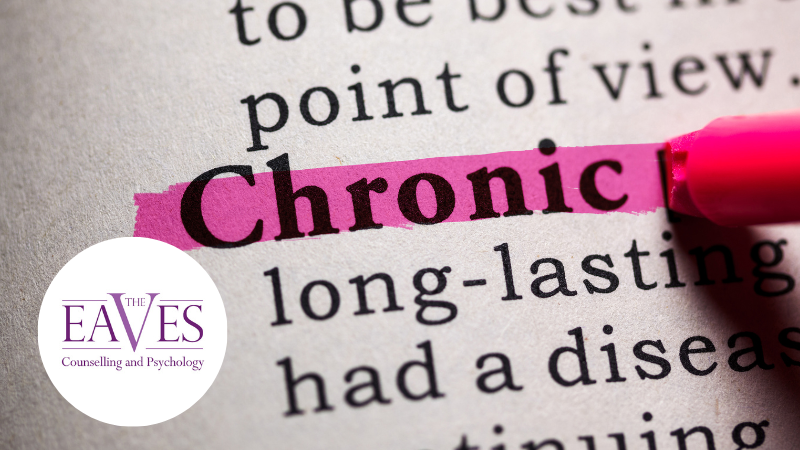Working with Chronic Illness
By Lucy Warner
As 13.7 million people life with a long- term illness in the United Kingdom (Department for Work and Pension, 2021) and 7.5 million people are registered as disabled (Public Health England), therapists in different settings including those in private practice, are likely to work with clients who have a chronic illness. Rates of depression (Patten, 2016), issues with work life (Mitchell, 2022) and loss of identity (Weingarten, 2013) have been extensively researched in recent years on the subject of how chronic illness can affect the individual.
The term “chronic illness” encompasses an extensive definition of long-term health conditions including cancer, lung disease, diabetes, MS, heart disease, kidney disease and bowel disease among many others (Bridges, 2018). A long-term physical illness is “a health problem that requires ongoing management over a period of years or decades and is one that cannot currently be cured but can be controlled with the use of medication and/or other therapies” (NHS Choices, 2022).
A diagnosis of a chronic illness can affect every aspect of a person’s life, including their intimate relationships. Extensive research has traditionally focused on the ill person. There is now a wealth of evidence in the literature (Weingarten, 2013, Duffy, 2020, McLeod, 2013, Basinger et al, 2021, Gray et al, 2017) relating to the effects illness has on relationships and partners, yet the role of therapists when working with chronic illness and the affects it has on the clients’ intimate relationships, has not received the same attention.
The fact of the matter is that we are all living longer. As people live longer, the prevalence of illness is increasing because of evolving medical interventions and science, and illness is going to be present in the therapy room. It is inevitable therefore, that therapists are going to see illness whether they specialise in working with ill- health such as with clients with cancer, or work with clients with other chronic illnesses such as heart disease, arthritis or diabetes for example. Living with a chronic illness is physically and psychologically demanding and the challenges of managing a chronic illness are not isolated to the individual, but also impacts the partner, loved ones, and social relationships within families.
The Eaves Counselling and Psychology
The Eaves Counselling and Psychology Ltd is a select professional body of Counsellors, Psychotherapists and Psychologists, providing high quality psychological care Monday to Saturday between 9am and 9pm from our practices in Guildford, Godalming, Farnham, Haslemere and online.
Find your practitioner in five easy steps
Are you a business owner or would like more support from your job? The Eaves’ own Employee Assistance Programme (EAP) service for small to medium businesses is easy, affordable and gives staff instant access to our large team of in-house Counsellors and Psychologists at a time and date to suit them. Contact us to find out more about our EAP service
If you need immediate support please find our list of useful contacts
References
Basinger, E.D. et al. (2021) “Couples managing chronic illness: A test of the extended theoretical model of communal coping,” Journal of Social and Personal Relationships, 38(5), pp. 1611–1632.
Bridges, R. (2018) Hearing the grief in illness and pain Therapy Today BACP, [online] 29(3). Available at: https://www.bacp.co.uk/bacp-journals/therapy-today/2018/april-2018/hearing-the-grief-in-illness-and-pain/
Duffy, A. (2020) Love Hurts: Chronic illness and the couple, BACP. Healthcare Counselling and Psychotherapy Journal. Available at: https://www.bacp.co.uk/bacp-journals/healthcare-counselling-and-psychotherapy-journal/october-2020/articles/love-hurts/
GOV.UK (2021) The employment of disabled people 2021. Available at: https://www.gov.uk/government/statistics/the-employment-of-disabled-people-2021/the-employment-of-disabled-people-2021
Gray, RM. Newton-John, T. Lee, J. and Ralfs, C. (2017) “Intimate Relationships and Chronic Illness: A literature review for counsellors and couple therapists,” Psychotherapy and Counselling Journal of Australia Available at: https://pacja.org.au/2017/08/intimate-relationships-and-chronic-illness-a-literature-review-for-counsellors-and-couple-therapists-2/
McLeod, J. (2013) “Process and outcome in pluralistic transactional analysis counselling for long-term health conditions: A case series,” Counselling and Psychotherapy Research, 13(1), pp. 32–43. Available at: https://doi.org/10.1080/14733145.2012.709873
Mitchell, E. (2022) Working with Chronic Illness Therapy Today, [online] (April). Available at: https://www.bacp.co.uk/bacp-journals/bacp-workplace/april-2022/working-with-chronic-illness/
NHS choices (2022). NHS. Available at: https://www.datadictionary.nhs.uk/nhs_business_definitions/long_term_physical_health_condition.html/
Patten, S. et al. (2016) “Patterns of association of chronic medical conditions and major depression,” Epidemiology and Psychiatric Sciences, 27(1), pp. 42–50. Available at: https://doi.org/10.1017/s204579601600072x
Public Health England (online). Health Matters: health and work-GOV.UK (www.gov.uk)
Weingarten, K. (2013) The “Cruel radiance of what is”: Helping couples live with chronic illness, Family process. U.S. National Library of Medicine. Available at: https://pubmed.ncbi.nlm.nih.gov/25408091/
Resources
https://www.patients-association.org.uk/
https://www.nhs.uk/conditions/social-care-and-support-guide/

